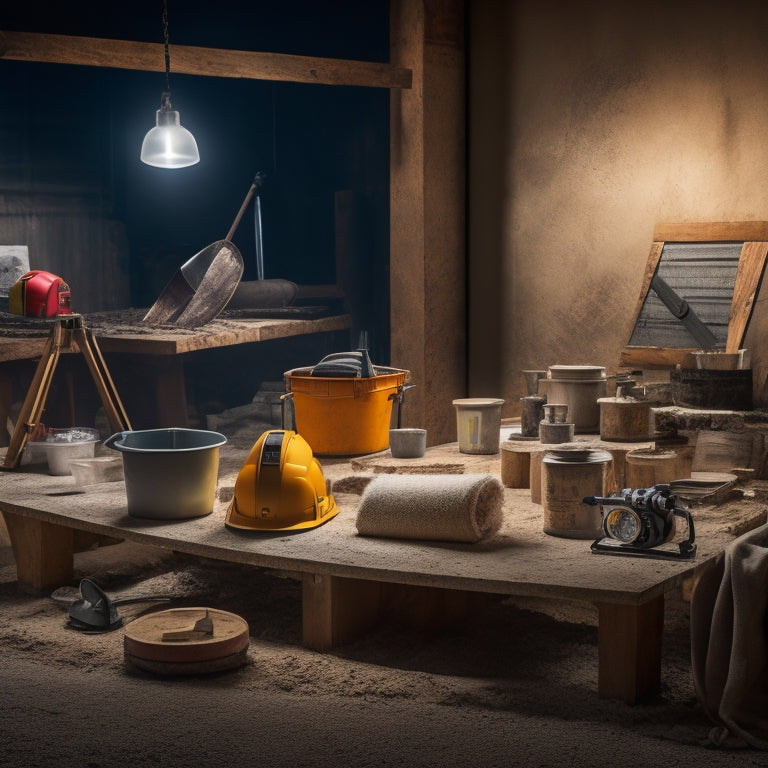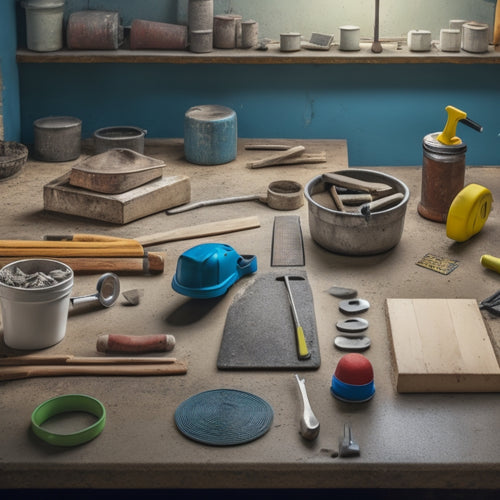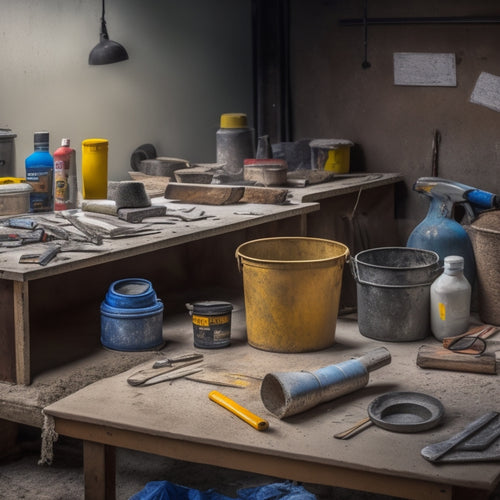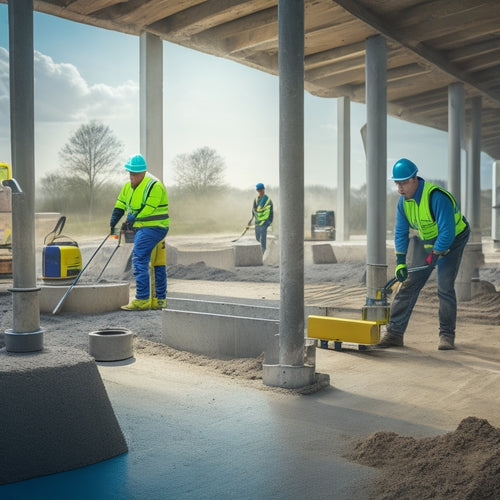
Essential Tools for DIY Concrete Wall Projects
Share
To tackle a DIY concrete wall project, you'll need essential tools that can handle the demands of drilling into concrete. These include a reliable drill, such as a rotary hammer drill or high-speed drill, and specialized drill bits, like carbide-tipped or diamond-coated bits. Additionally, safety gear is vital to minimize injury risk, including safety glasses, gloves, a dust mask, and hearing protection. Ergonomic handle design and regular maintenance are also important considerations. As you prepare for your project, make certain you have the right tools and knowledge to guarantee a successful outcome, and explore the specific requirements for your project.
Key Takeaways
- Use a rotary hammer drill for heavy-duty concrete projects and a high-speed drill for smaller tasks.
- Choose the right drill bit type, such as carbide-tipped or diamond-coated, based on the project's requirements.
- Ensure proper drill bit size and geometry for optimal performance and consider flute design and cutting edge geometry.
- Wear protective gear, including safety glasses, gloves, and a dust mask, to minimize injury risk during drilling.
- Regularly maintain equipment and follow safety guidelines to extend drill bit lifespan and prevent accidents.
Concrete Drilling Equipment Checklist
When drilling into concrete walls, you'll need the right equipment to confirm a safe and successful project. It's vital to have a concrete drilling equipment checklist that includes a drill, bits, and other necessary tools.
Before you start drilling, verify you've completed the necessary concrete wall preparation steps, such as cleaning the area and marking the spot where you'll be drilling.
To avoid damaging the wall or your equipment, follow some essential drilling technique tips. First, choose the right drill bit for the job, taking into account the type of concrete and the size of the hole you need to create.
Next, use a steady and consistent drilling motion, applying moderate pressure and gradually increasing the speed as needed. It's also important to keep the drill bit cool by occasionally withdrawing it from the hole and allowing it to cool.
Essential Drilling Tools for Concrete
To efficiently drill into concrete, you'll need a range of essential tools that cater to various project requirements, including specific types of drills and drill bits.
For heavy-duty projects, a rotary hammer drill is ideal, as it provides high torque and impact energy. However, for smaller tasks, a high-speed drill may be more suitable.
When it comes to drill bits, carbide-tipped bits are recommended for drilling into concrete, as they offer increased durability and resistance to wear.
For core drilling, a diamond-coated drill bit is essential, as it allows for precise and efficient drilling of large holes. Additionally, a drill bit with a built-in anchor system can simplify the process of installing wall anchors.
When selecting drill bits, consider the type of concrete you're working with, as well as the desired hole size and depth.
Hammer Drill Buying Guide
When buying a hammer drill for your DIY concrete wall project, you'll need to take into account several key factors to guarantee you get the right tool for the job.
You'll want to think about the type of drill bits you'll need, as well as the power and speed required to efficiently drill through concrete.
Additionally, an ergonomic handle design can make a big difference in reducing fatigue and improving control during extended drilling sessions.
Drill Bit Selection
You'll need to choose the right drill bits for your hammer drill to effectively penetrate concrete, and selecting the correct type and size is necessary for ideal performance and minimizing damage to the surrounding material.
When it comes to drill bit materials, you'll want to focus on high-quality options that can withstand the rigors of concrete drilling. Look for bits made from tungsten carbide or diamond-coated materials, as these will provide the best results.
It's also essential to reflect on the drill bit's geometry, including the flute design and cutting edge, as these factors can greatly impact performance.
Regular drill bit maintenance is also important to guarantee peak performance and extend the life of your bits. After each use, inspect your drill bits for wear and tear, and clean them thoroughly to prevent debris buildup.
You should also store your drill bits in a dry, secure location to prevent damage.
Power and Speed
Selecting a hammer drill that balances power and speed is essential for efficiently drilling into concrete, as it directly impacts the tool's ability to penetrate dense materials effectively. When shopping for a hammer drill, you'll want to evaluate the drilling performance and torque specifications to guarantee it meets your needs.
| Drill Type | Torque (Nm) | Drilling Speed (RPM) |
|---|---|---|
| Basic Hammer Drill | 40-60 | 1,000-2,000 |
| Mid-Range Hammer Drill | 60-100 | 2,000-3,500 |
| High-Torque Hammer Drill | 100-150 | 3,500-5,000 |
| Heavy-Duty Hammer Drill | 150-200 | 5,000-6,000 |
| Premium Hammer Drill | 200-250 | 6,000-8,000 |
When evaluating hammer drills, contemplate the type of concrete you'll be working with and the size of the holes you need to drill. A higher torque specification will provide more power for drilling through dense materials, while a higher drilling speed will allow for faster completion of smaller holes. By balancing power and speed, you'll be able to achieve ideal drilling performance and complete your DIY concrete wall project efficiently.
Ergonomic Handle Design
A well-designed ergonomic handle is essential for reducing fatigue and improving control during extended drilling sessions, as it allows you to maintain a firm grip on the hammer drill even in demanding concrete drilling applications.
When shopping for a hammer drill, look for ergonomic grips that fit comfortably in your hand, providing a secure grasp and minimizing strain on your wrist and arm. A contoured handle with cushioned grips will help absorb vibrations, reducing the impact on your body.
Consider a hammer drill with a rotating handle or a pistol-grip design, which allows you to adjust the handle to fit your natural hand position. This feature enhances user comfort and reduces fatigue, enabling you to work for extended periods without discomfort.
Additionally, a hammer drill with a built-in shock absorption system can further reduce the impact of vibrations on your hand and arm.
Rotary Hammer Drill Options
When selecting a rotary hammer drill for your DIY concrete wall project, you'll need to take into account the types of drill bits that will work best for your specific needs.
You'll want to choose a drill that can accommodate a variety of bits, including those designed for drilling into concrete, masonry, and other materials.
Additionally, you'll need to ponder safety features, such as vibration control and ergonomic design, to guarantee you can use the drill comfortably and safely.
Drill Bit Selection
You'll need to choose the right drill bit for your rotary hammer drill to effectively penetrate the concrete wall, considering factors such as bit type, size, and material. The type of drill bit you select will greatly impact the efficiency and accuracy of your project. For concrete walls, a carbide-tipped or diamond-coated drill bit is recommended, as they provide excellent durability and resistance to wear.
When selecting a drill bit, make sure it's compatible with your rotary hammer drill. Check the drill bit's shank size and type to confirm it matches your drill's chuck. Additionally, consider the drill bit's flute design, which affects the removal of debris and dust. A well-designed flute will help prevent clogging and improve drilling performance.
Regular drill bit maintenance is essential to extend its lifespan and maintain peak performance. Clean the drill bit after each use, and store it in a dry place to prevent rust. Inspect the drill bit regularly for signs of wear, and replace it when necessary.
Hammer Drill Safety
Operating a rotary hammer drill safely requires attention to specific guidelines and precautions to minimize the risk of injury and guarantee a successful DIY concrete wall project. As you prepare to use your hammer drill, make certain you're wearing the necessary protective gear, including safety glasses, gloves, and a dust mask.
| Safety Precaution | Description | Importance |
|---|---|---|
| Regular Hammer Drill Maintenance | Check for worn or damaged parts, and perform routine cleaning and lubrication | Prevents equipment failure and reduces risk of injury |
| Secure Work Area | Verify the work area is clear of debris and tripping hazards | Prevents accidents and injuries |
| Proper Handling | Hold the drill firmly and maintain control during operation | Prevents loss of control and reduces risk of injury |
When operating a rotary hammer drill, it's vital to follow the manufacturer's instructions and take necessary precautions to avoid injury. Regular hammer drill maintenance is fundamental to guarantee the equipment is in good working condition. Additionally, wearing protective gear and maintaining a secure work area will help you stay safe and focused on your DIY concrete wall project. By following these guidelines, you'll be able to complete your project efficiently and effectively.
Diamond Drill Bit Selection
Selecting the right diamond drill bit for your concrete wall project involves considering the type of concrete, the desired hole size and depth, and the drill's power and speed. You'll want to choose a bit that's designed for your specific concrete type, whether it's high-strength, reinforced, or contains aggregates like rebar or fiber mesh.
When selecting a diamond drill bit, consider the following factors:
-
Bit type: Choose from various diamond drill bit types, such as core bits, hole saws, or twist bits, depending on your project's requirements.
-
Diamond quality: Look for high-quality diamonds that are securely bonded to the bit's matrix for peak performance and longevity.
-
Bit size and depth: Select a bit that matches your desired hole size and depth to guarantee accurate and efficient drilling.
-
Drill compatibility: Confirm the bit is compatible with your drill's power and speed to prevent damage or inefficient drilling.
-
Maintenance: Regularly inspect and maintain your diamond drill bit to prevent wear and tear, and to guarantee peak performance.
Carbide Drill Bit Alternatives
When working with concrete walls, consider carbide drill bit alternatives that offer improved durability and performance, particularly for drilling through dense or abrasive materials.
You'll want to explore options that can withstand the rigors of concrete drilling, such as diamond-coated drill bits or high-speed steel (HSS) bits with specialized coatings.
Diamond-coated drill bits are a popular alternative to carbide drill bits, as they provide superior wear resistance and can handle high drilling speeds. These bits are ideal for drilling through reinforced concrete or dense aggregates.
On the other hand, HSS bits with specialized coatings, such as titanium nitride (TiN) or chromium nitride (CrN), offer enhanced hardness and corrosion resistance. These coatings can considerably extend the life of your drill bit and improve drilling performance.
When selecting a carbide drill bit alternative, consider the specific requirements of your project, including the type of concrete, drilling speed, and desired level of precision.
Drill Bit Size and Type
You'll need to choose a drill bit that matches the specific requirements of your concrete wall project, considering factors such as hole size, material thickness, and desired drilling speed. The right drill bit size and type can make a significant difference in the efficiency and accuracy of your project.
When selecting a drill bit, consider the following factors:
-
Drill bit materials: Carbide-tipped, high-speed steel, and diamond-coated bits are popular options for concrete drilling. Each material has its strengths and weaknesses, so choose the one that best suits your project needs.
-
Drill bit shapes: Twist bits, spade bits, and hole saws are common shapes used for concrete drilling. Twist bits are ideal for small holes, while spade bits are better suited for larger holes.
-
Hole size and depth: Choose a drill bit that can accommodate the desired hole size and depth. Consider the thickness of the concrete and the type of anchor or fastener you'll be using.
-
Drilling speed: Select a drill bit that can handle the desired drilling speed. Faster drilling speeds may require specialized drill bits.
-
Concrete type: Different types of concrete require different drill bit types. For example, reinforced concrete may require a drill bit with a specialized tip.
Safety Gear for Drilling Concrete
Most concrete drilling projects require a minimum of three essential safety gear items: safety glasses, a dust mask, and gloves, to protect you from the hazardous effects of flying debris, airborne particles, and vibration.
As you prepare to drill into concrete, it's imperative to prioritize your safety. Start by donning protective eyewear, such as safety glasses or goggles, to shield your eyes from flying particles. A dust mask is also critical, as it filters out airborne particles and prevents inhalation of hazardous materials. Gloves will protect your hands from vibration and abrasion, guaranteeing a secure grip on your drill.
In addition to these basics, consider investing in hearing protection, such as earplugs or earmuffs, to safeguard your hearing from the loud drilling noise. Concrete drilling can generate high levels of noise, which can cause permanent damage to your hearing.
By wearing hearing protection, you can prevent this damage and guarantee a safe working environment. By incorporating these safety gear items into your DIY concrete wall project, you'll be well-equipped to tackle the task at hand while protecting yourself from potential hazards.
Power Source and Accessories
Selecting the right power source and accessories is essential for efficiently drilling into concrete, as it directly impacts the performance and longevity of your drill. When working on a DIY concrete wall project, you'll need a reliable power source to keep your tools running smoothly. Consider investing in a high-quality drill with a robust motor that can handle the demands of concrete drilling.
To guarantee uninterrupted power supply, consider the following options:
-
Generator options: Portable generators or inverter generators can provide a reliable power source, especially in areas with frequent power outages.
-
Extension cords: Heavy-duty extension cords with a high amp rating can help you reach distant areas without compromising power quality.
-
Cordless drill batteries: High-capacity lithium-ion batteries can provide extended runtime and reduce downtime.
-
Power inverters: Convert DC power from your vehicle or battery to AC power for your drill.
-
GFCI protection: Ground Fault Circuit Interrupter (GFCI) outlets or circuit breakers can prevent electrical shock and guarantee a safe working environment.
Frequently Asked Questions
Can I Use a Regular Drill for Concrete Projects?
When tackling concrete projects, you'll need a drill that can handle the tough material.
You can't use a regular drill, as it won't provide enough power or control. Instead, you'll need a drill specifically designed for concrete, such as a hammer drill or a rotary hammer drill.
Familiarize yourself with different drill types and drilling techniques to guarantee you're using the right tool for the job. This will help you achieve precise results and avoid damaging your equipment.
How to Mix Concrete for Best Drill Performance?
You're about to commence on a concrete-mixing marathon that will leave you a master of the trade!
To achieve the best drill performance, you need to nail the mixing techniques.
Aim for a concrete consistency that's just right - not too dry, not too wet.
A good rule of thumb is to mix 1 part cement to 2-3 parts aggregate, with just enough water to create a workable paste.
What Causes Drill Bits to Overheat on Concrete?
When drilling into concrete, you'll likely encounter overheating issues with your drill bits. This is often caused by using drill bits made from low-quality materials that can't withstand the friction and heat generated by drilling into concrete.
To prevent overheating, you should use drill bits made from high-quality materials like tungsten carbide or diamond-coated tips.
Additionally, applying a lubricant, such as water or a drilling oil, can help reduce friction and heat buildup.
Can I Resharpen My Own Concrete Drill Bits?
Sharpen your skills, not just your drill bits!
Can you resharpen your own concrete drill bits? Yes, you can.
Familiarize yourself with sharpening techniques, such as using a diamond stone or a sharpening jig.
Consider the bit materials, like tungsten carbide or high-speed steel, which require specific sharpening methods.
With practice and patience, you'll be able to revive dull bits and extend their lifespan, saving you time and money in the long run.
How to Store Drill Bits to Prevent Damage?
You need to protect your drill bits from damage. Invest in a designated drill bit storage case. Choose one made of sturdy plastic or metal.
The protective case keeps drill bits from coming into contact with other metal tools and from scratching one another.
Opt for cases that separate individual drill bits by type, using different dividers to compartmentalize smaller units such as miniature precision tools from ones needing wrench assist operations.
Conclusion
You may think that tackling a DIY concrete wall project is an intimidating task, but with the right tools, it's definitely achievable.
Don't let concerns about drilling through concrete hold you back. With the essential tools outlined here, you'll be equipped to handle even the toughest concrete drilling tasks.
From hammer drills to diamond drill bits, you'll be able to make precise holes and drive anchors with ease.
Get ready to tackle your project with confidence.
Related Posts
-

Must-Have Tools for Laying Concrete Tiles
When laying concrete tiles, you'll need a range of essential tools to get the job done right. Start with subfloor pre...
-

3 Best Tools to Buy for Concrete Repair Online
When buying tools for concrete repair online, you'll want to research multiple retailer options to find the best prod...
-

What Tools Ensure Precise Concrete Leveling Results
You need a range of specialized tools to achieve precise concrete leveling results. Laser leveling instruments provid...


